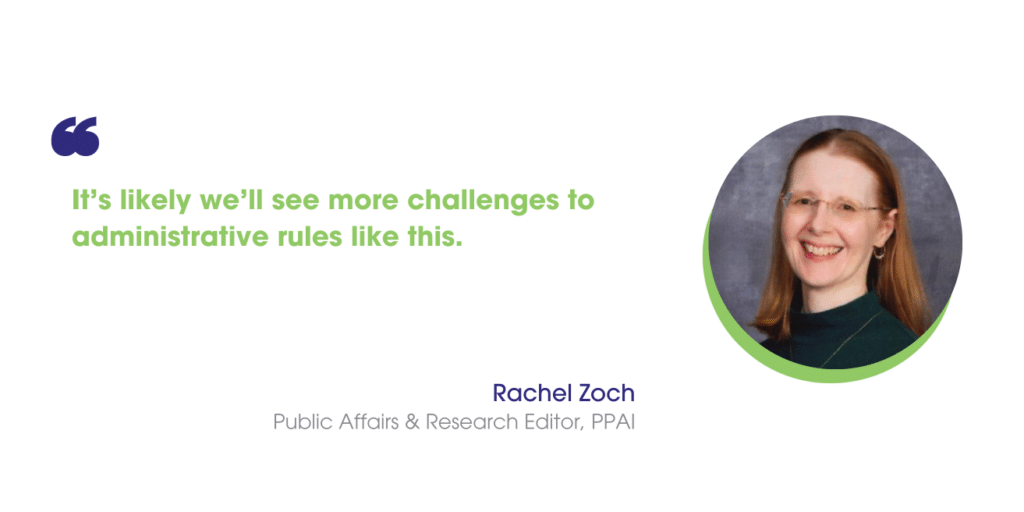The Federal Trade Commission’s new rule banning employers from imposing non-compete clauses on their employees has been denied by a federal judge in Texas.
Following up on her decision last month to grant a preliminary injunction preventing the rule from taking effect in September, U.S. District Judge Ada Brown on Tuesday struck down the ban, saying that the FTC didn’t have the power to issue such a sweeping regulation.
“The role of an administrative agency is to do as told by Congress, not to do what the agency thinks it should do,” Brown wrote in a 27-page opinion. “In sum, the court concludes that the FTC lacks statutory authority to promulgate the non-compete rule, and that the rule is arbitrary and capricious. Thus, the FTC’s promulgation of the rule is an unlawful agency action.”
‘Potential Appeal’
U.S. Chamber of Commerce President and CEO Suzanne Clark called the decision a “significant win in the Chamber’s fight against government micromanagement of business decisions.”
Meanwhile, FTC spokesperson Victoria Graham said the agency is “seriously considering a potential appeal.”
“We’re disappointed by Judge Brown’s decision and will keep fighting to stop non-competes that restrict the economic liberty of hardworking Americans, hamper economic growth, limit innovation and depress wages,” Graham said in a statement to ABC News.

Conflicting Decisions
- The motion was requested by tax preparation company Ryan LLC and the U.S. Chamber of Commerce, which filed a lawsuit just one day after the FTC’s 3-2 vote to issue the ban, which was set to take effect on September 4.
However, on July 23, a federal judge in Pennsylvania denied a small business’ request to temporarily block the ban.
- U.S. District Judge Kelley Hodge in Philadelphia said that the “FTC is empowered to make both procedural and substantive rules as is necessary to prevent unfair methods of competition” under Section 5 of the FTC Act.
And then last week, a federal judge in Florida also temporarily blocked the ban.
- U.S. District Judge Timothy Corrigan cited the “major questions doctrine,” which says that federal agencies can only issue rules with broad societal impacts with Congress’ explicit permission, Reuters reported.
Breaking Down The FTC Ruling
- About 30 million people (20% of U.S. workers) have signed non-competes, according to the FTC.
In February, PPAI Media listed non-compete clauses as one of the key employment areas to watch in 2024 after the FTC proposed the legislation that this ban initially stemmed from in January.
- California, Minnesota, Oklahoma and North Dakota have already banned noncompete agreements, and at least a dozen other states have passed laws limiting their use, Reuters reported.
Rachel Zoch, public affairs and research editor at PPAI, says that the U.S. Supreme Court overturned a 40-year precedent of deference to federal agencies in June, “so it’s likely we’ll see more challenges to administrative rules like this.”
“It’s possible that Congress will take up the issue, but not before the election,” Zoch says.
On July 3, Brown partially blocked the rule, saying that the FTC “lacks the substantive rulemaking authority with respect to unfair methods of competition.”
Non-compete clauses are a contractual term between an employer and a worker that blocks the worker from working for a competing employer or starting a competing business, typically within a certain geographic area and period of time after the worker’s employment ends.
Last year, Joshua White – then the head of strategy and general counsel at BAMKO and a member of the PPAI Board of Directors – wrote a column for PPAI Media arguing against non-compete contracts as a practice in promo and predicting the FTC’s decision.
“The point here is not to challenge your opinion on non-competes,” White wrote. “I expect the FTC will take that issue out of your hands soon enough. My point is to challenge the way you think about people, culture and the role you play in shaping both.”
Written by: John Corrigan
Published with Permission from PPAI